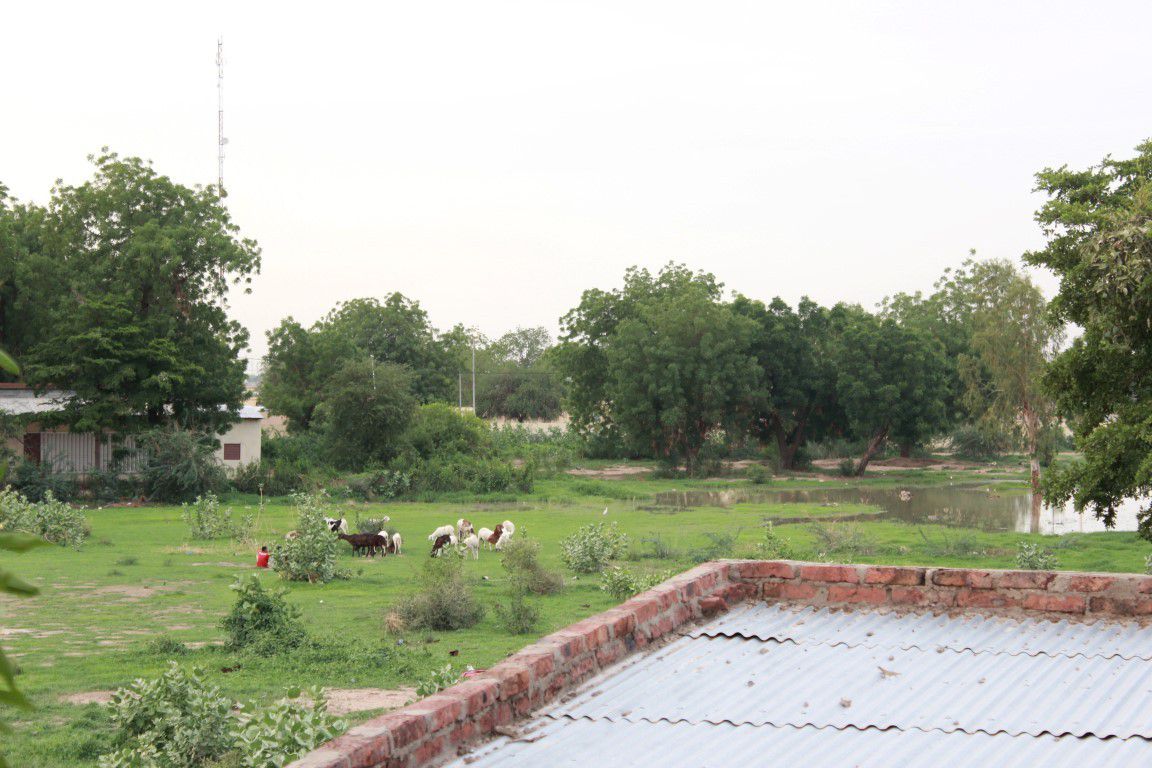Carnets de voyage – Tchad 2
The pathway and slum in front of our house at the beginning of the rainy season (within a few weeks it will be impossible to go through this road)
Sunday October 4th, Atatürk International Airport
As I am sitting in a café, exhausted from a sleepless night, and, in between two flights, I try to list and describe those cute little things I liked or witnessed in Chad, that could enlighten my day, or just make me smile. All these pieces put together, and many others I may have forgotten in this small list, assemble the picture of my life in Chad I will miss and remember.
- The greetings, how are you’s and smiles we exchange with everybody, in shops, restaurants, in the street, every time we engage the conversation with someone, before starting the point of our business or the initial goal of the conversation. I like this way of really considering the other person, of taking the time to talk before getting to the point.
- The bred bought at the corner shop wrapped in printed accounts lists of the World Food Programme.
- Spelling mistakes, or I could say funny writing trials, on signboards of shops and restaurants, like the small one near our house, in front of the high school, reading “Chandiwiches”.
- The photo booths, these small, colorful cabins that look like giant wooden doll houses standing by the street and decorated with painted smiling faces.
- On the dance floor, men and women gently gathering around me or us (white people), showing us the moves, encouraging, challenging and celebrating us dancing with them the Chadian and African rhythms – one Chadian especially difficult dance move is the shake our upper chest and shoulders as fast as possible, arms and knees bent. They challenge each other to do it faster and longer. This I have not been able to master until now! Chadians like to see white people (or anybody actually) who like to dance, and they are always impressed to see one dance well “like an African” – which mainly means shaking your butt, also your feet and knees and, in some Chadian, Sudanese and Ethiopian songs, your shoulders as well. This is the trickiest for us, Westerners, I think, because we never learned to dance with our shoulders, they are still and unorganized.
- Calling Mr John (our favorite Ghanaian tailor) to say that I am coming picking up my dress – he answers welcome. But five minutes later he calls me back apologizing that he had forgotten me and the dress is still not ready after one week.
- The flowers and trees and herbs shops by the road, small and green gardens of fresh quietness.
- Kids waving at me and smiling with large smiles “nassaran” while ignoring my African colleagues walking with me. Especially when I was biking around Moissala and struggling in the sand, they must be wondering, who and why is this white girl using a bike?
- Greetings exchanged in Chadian Arabic with our drivers. Sadly I did not catch much more Chadian Arabic than these, partly because I am already telling myself that it is so strange and different I cannot remember any other words I have been told, and partly because I did not write them down and try to use them every possible time.
- The little girls selling peanuts in reused coke bottles by the road (yes everything happens by the road, also men selling praying carpets, toys, cigarettes, phone credit, rainbow color brooms, tablecloths…). They are all running at stopping cars, practicing their few English or French words and smiling, waiting – but there is fierce competition among them about who will get to sell their bottle first and earn the money.
- The sheeps (because now I know they are sheeps and not goats, because of course sheeps do not have fluffy wool on their backs or they would not resist the heat) quietly grazing in the field behind our house. I love watching them, under the rain all gathered and flocked as one, under the hard sun trying to find some shadow, when the grass is high and all green devouring heartfully and, when it gets rare and short, still continuing to eat what is left restlessly. I tried to count them, before and after Eid days, to make sure they would not all be sacrificed, but I was always glad to see many still remained.
- Little boys going all together poop in the field behind our house; usually led by one of them, they sit in a round and all get their pants down at the same time and do it together, they get up and continue their games as they were playing just before.
- Men, young and older, sitting by our wall at nighttime, to get advantage of our sharp lights (designed to protect us from theives by lightening our outside walls, they are turned into public lightening, as this does not exist in this part of the city). They chat, and eat peacefully. Sometimes children gather as well, playing, jumping around our cars coming in and out.




